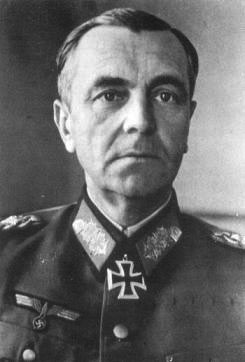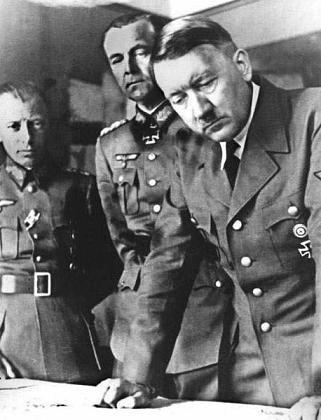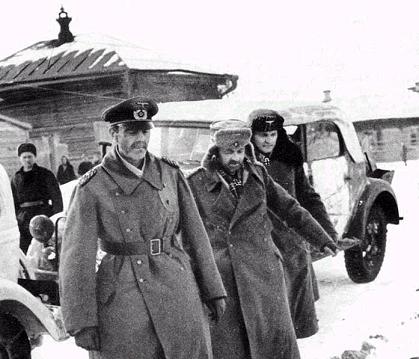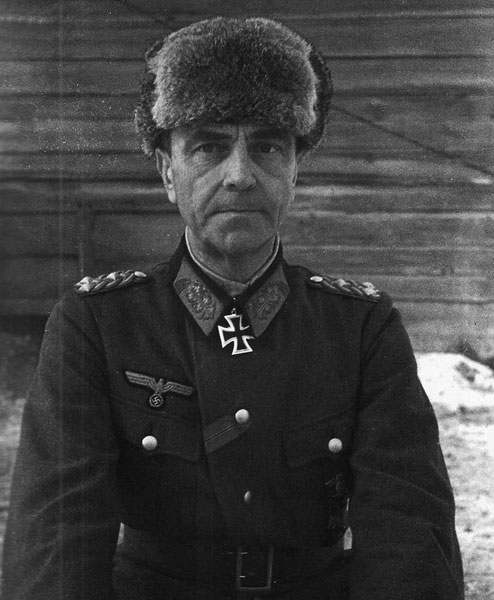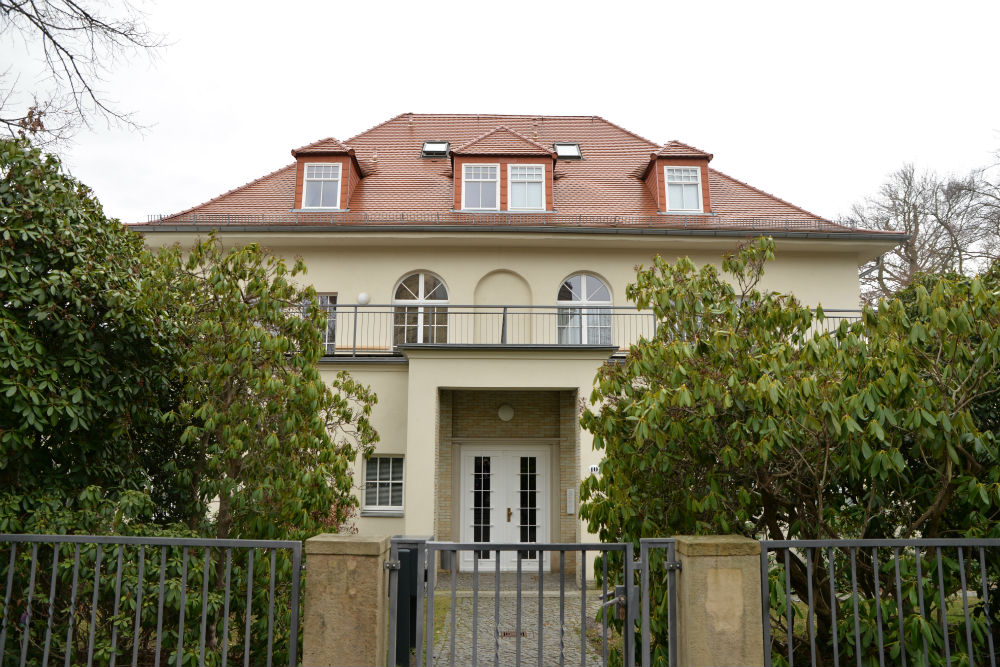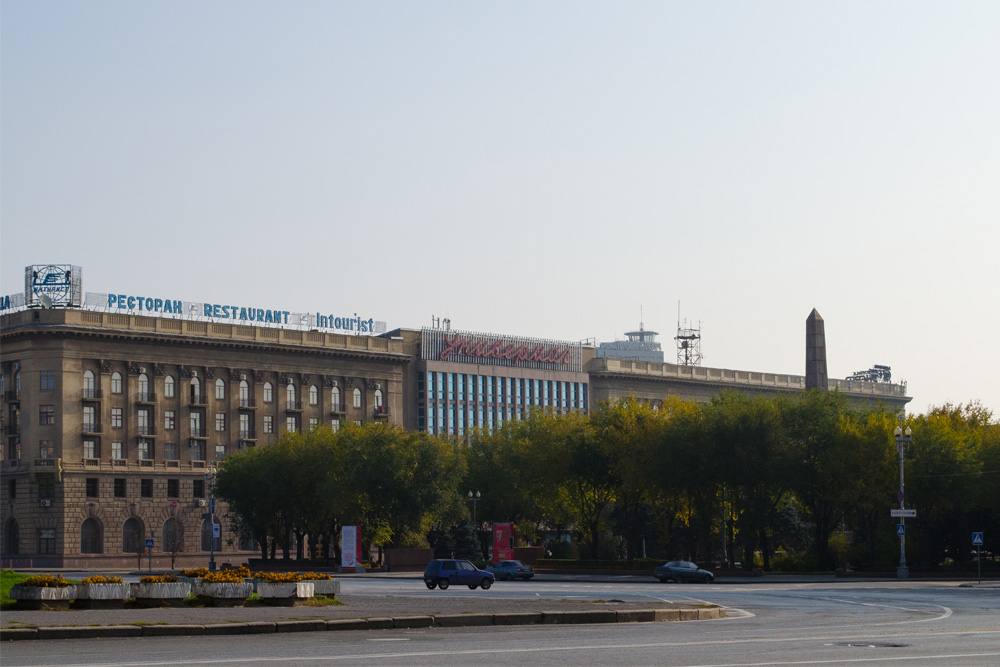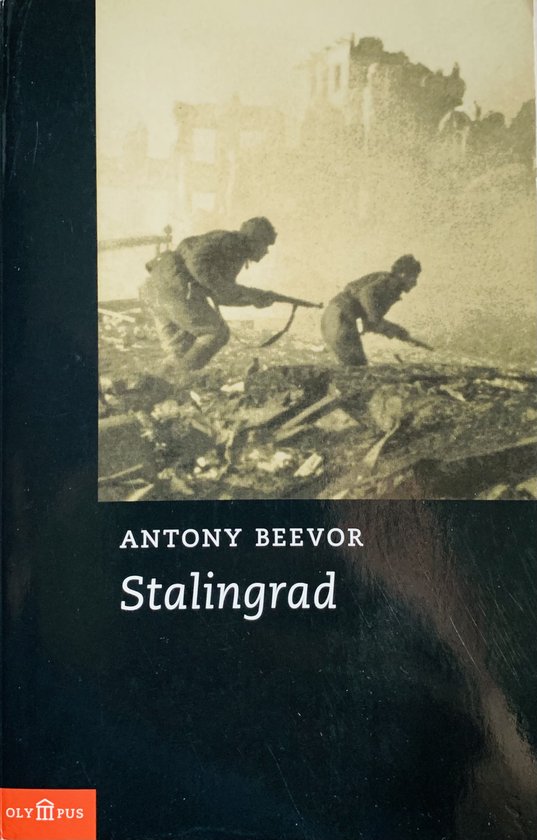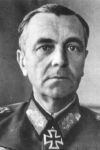Friedrich Paulus
Early years
Friedrich Wilhelm Ernst Paulus was born September 23rd. 1890 in Breitenau, Hessen. His father was employed as a bookkeeper in a correctional institution. The family was not of noble descent, hence the family name did not include ‘von’ as is often assumed incorrectly. After graduating from secondary grammar school in Kassel in 1908, he applied for a job in the navy but was rejected because he was not of aristocratic origin. He went on to study law at Marburg University. In 1910 he joined the army and was posted to 3. Infanterieregiment in Rastatt (Baden) as Fahnenjunker (cadet). He was promoted to Leutnant in 1911 and on July 4th, he married Elena Rosetti-Solescu. Her brothers were both officer, serving in Paulus’ regiment and that is how he met her. She stemmed from a wealthy and aristocratic Romanian family. Their first child, a daughter named Olga was born in 1914. The twins Friedrich and Ernst-Alexander were born on April 11th, 1918 and both were to become career officers.
Paulus’ regiment joined battle on the western front. He fell ill in November 1914 and after he had regained his health, he became staff officer of 2. Preusisches Jägerregiment, a unit of the Alpenkorps. The unit served in eastern Europe and later on the western front as well, suffering heavy losses. At the end of the war, Paulus had risen to the rank of Hauptmann. During the war, he never commanded a unit. He remained in the army but it was obvious he had no talent for command. He was in command of 3. Kompanie 13. Infanterieregiment for a while but he spent more time as staff officer. In this period, his superiors noticed he did not make decisions easily.
Reichswehr and Wehrmacht
On March 28th, 1920, Paulus became adjutant of the Badische 14. Infanterieregiment of the new Reichswehr in Konstanz. On June 1st, 1922, Paulus was transferred to the staff of Gruppenkommando 2 in Kassel before he took up training for general staff officer at the Reichswehrministerium in Berlin in October. In 1923, he was posted to the general staff in Kassel. April 1st, 1925 saw him transferred to the staff of Infanterieführer V and on October 1st 1926 to the staff of Artillerieführer V in Stuttgart where he found employment as a teacher for a number of years. From October 1st, 1927 onwards, he was in command of 2. Kompanie Württembergischer Infanterieregiment 13 in Stuttgart. He held this post for exactly three years: on October 1st, 1930, he was instructor of tactics on the staff of 5. Infanteriedivision. His promotion to Major followed on February 1st, 1931 and in that year he was also named head of the Lehrgang Taktik at the Reichswehrministerium, a post he was to hold for the next three years.
On June 1st, 1933, Paulus was promoted to Oberstleutnant. He was given his first appreciable command on April 1st, 1934: commander of Kraftfahr-Abteilung 3, in Wünsdorf near Berlin, renamed in the same year Aufklärungs-Abteilung (mot.) 3, (reconnaissance unit) one of the first German motorized battalions. On June 1st, 1935, Paulus was promoted to Oberst and in September he succeeded Heinz Guderian (Bio Guderian) as Chief of Staff Kommando Kraftfahrtruppen (motorized forces) in Berlin. This command coordinated the build up of the armored units within the Wehrmacht. Paulus adapted quickly to the new ideas of mobile warfare and was closely involved in the development of the motorized branches of the newly established Wehrmacht. Paulus was no Nazi and he had nothing to do with the seizure of power by the N.S.D.A.P. but he entertained Hitler’s ideas (Bio Hitler). From November 1st, 1938 onwards, Paulus was Chief of Staff XVI Armeekorps (mot.) in Berlin, the first motorized corps of the German armed forces. Paulus was promoted to Generalmajor on January 1st, 1939 and from May 1st onwards, he was Chief of Staff of Heeresgruppe 4 in Leipzig. Units of this army group occupied Prague on March 15th, 1939. 10. Armee was formed from Heeresgruppe 4 on August 26th.
Serving in 6. Armee
General der Artillerie, Walther von Reichenau (Bio Von Reichenau) was the commander of 10. Armee. Paulus preferred commanding a desk and keep the administration in order while Von Reichenau preferred being among the troops. 10. Armee advanced through Poland without too many difficulties. On October 10th, 1939, 10. Armee was renamed 6. Armee. Shortly after, the army was transferred to the west, in order to participate in the campaign against Belgium and France. Paulus was present when King Leopold III (Bio Leopold III) signed the surrender of the Belgian army. 6. Armee remained in France and was to become part of the force that would invade Great Britain during Operation Seelöwe (Sea lion).
On August 1st, 1940, Paulus was promoted to Generalleutnant and was given a new post in September: he became Oberquartiermeister I (Supreme Quartermaster) of the Oberkommando des Heeres (O.K.H. supreme command of the army), the staff of the land forces. In this capacity, Paulus inspected Erwin Rommel’s Afrikakorps (Bio Rommel) in April and May 1941. He wrote a highly critical report on Rommel’s strategy but Hitler took no action. After the plan to invade Great Britain had been abandoned, Paulus began preparing for Operation Barbarossa, the invasion of the Soviet Union. The attack was launched on June 22nd, 1941. For Paulus, things became a little quieter as the O.K.H. had planned no large operations elsewhere. Paulus’ former 6. Armee was also part of the army of invasion and Paulus watched the progress of this army with great interest.
In December 1941, the drive ground to a halt. Moscow and Leningrad had not yet been captured and Heeresgruppe Süd had not yet reached the Caucasus. The commander of this army group, Generalfeldmarschall Gerd von Rundstedt (Bio Von Rundstedt) wanted to retreat but Hitler refused permission. Von Rundstedt was summarily sacked and replaced by Von Reichenau. Recommended by Von Reichenau, Paulus was to be given command of 6. Armee instead of one of the more experienced commanders. Hitler approved and on January 1st, 1942, Paulus, without hardly ever having commanded a unit, became the new commander of 6. Armee, which was at that moment in the vicinity of Charkov in the Ukraine. Moreover, Paulus was promoted to General der Panzertruppen. Von Reichenau died shortly after and was replaced by Generalfeldmarschall Fedor von Bock (Bio Von Bock). Paulus did not make a good start as commander but the O.K.H. did not want to relieve him of his command. In order to assist him, his Chief of Staff was replaced by the fanatic Nazi Generalmajor Arthur Schmidt.
The battle for Stalingrad
In June 1942, a new offensive was launched in southern Russia, code named Operation Blue. Heeresgruppe B, including 6. Armee was to advance to the River Volga near Stalingrad but not capture the city yet. 6. Armee started its drive on June 30th. At that moment, it was the largest formation on the eastern front. On September 3rd, Stalingrad was surrounded with the Germans in the north, west and south and the wide Volga in the east.
On September 12th, 1942 Paulus flew to the commander of Heeresgruppe B, Generalfeldmarschall Maximilian Reichsfreiherr von Weichs (Bio Von Weichs). Together they saw Hitler and drew his attention to the outstretched, open northern flank and the shortage of reserves and reinforcements. Their arguments fell on deaf ears though. Back in Stalingrad, Paulus noticed that capturing the city was going to take a long time. Winter was approaching as well and he asked permission to withdraw XVI Panzerkorps to form a reserve. This request was also denied and Paulus did not pursue the matter any further. Paulus was too obedient and no one else could persuade Hitler to put a stop to the offensive. This probably was the reason Hitler liked Paulus; he was docile and loyal and followed Hitler’s orders nearly always correctly. Also, Paulus was of common ancestry, just like Hitler.
On September 13th, a new offensive was launched. Paulus wanted to split the city in two by striking towards the Volga through the center of the city. Paulus’ 6. Armee suffered horrendous losses but at the end of October, 90% of the city was in German hands. The Germans dispatched all available troops to Stalingrad. On November 19th, a massive counter offensive was launched by the enemy, Operation Uranus. The troops in Stalingrad were surrounded. Nonetheless Hermann Göring (Bio Göring) boasted his Luftwaffe could fly provisions to 6. Armee. However, almost 300.000 troops were present in the encircled area. One of the corps commanders, General der Artillerie Walther von Seydlitz-Kurzbach (Bio Von Seydlitz) warned Paulus and urged him to break out. Paulus refused to listen and obeyed Hitler’s orders. General der Infanterie Schmundt, Hitler’s adjutant also paid him a visit. He told him: "If you manage to capture Stalingrad, you will be allowed to succeed General der Artillerie, Alfred Jodl (Bio Jodl) as Chief of Staff of the O.K.W. Walther von Seydlitz-Kurbach will then succeed you."
The end of the Cauldron
Meanwhile the situation in Stalingrad worsened by the day. The Luftwaffe flew in far too little supplies. Generalfeldmarschall Erich von Manstein (Bio Von Manstein) was put in command of the newly established Heeresgruppe Don that was tasked with relieving 6. Armee. Von Manstein urged Paulus to break out himself to join the army of liberation. It was Paulus’ last chance. Just like on all other occasions, Paulus remained the obedient officer and refused to break out. Von Manstein’s offensive soon ground to a halt and on Christmas, all hope was lost.
On January 8th, 1943, the Soviets sent an ultimatum to Paulus. It stated he could surrender honorably or his army would be totally annihilated. Paulus contacted Hitler by radio. He said he was not to surrender and so, Paulus refused to accept the ultimatum.
The area occupied by the Germans in and around the city dwindled by the day. It even dawned on Adolf Hitler there was no hope left. He awarded Paulus a high decoration and promoted him to Generalfeldmarschall. As a German generalfeldmarschall had never surrendered yet, Hitler expected Paulus to commit suicide. Paulus however did not do so. On January 31st, Soviet troops reached his HQ. Paulus lay quietly on his bed, smoking and a Russian officer asked him to surrender. Paulus was tired and did not resist.
Prisoner of war
Some 130.000 Axis soldiers were taken prisoner in Stalingrad; some 500.000 perished. Years after the war, only 6.000 prisoners returned to Germany. In February 1943, Paulus was imprisoned in a monastery in Suzdal but after six months, he and hundreds of other German, Japanese and Italian generals were housed in Prisoner of war Camp No. 48, better known as camp Voikovo in the village of Cherntsy, some 155 miles northeast of Moscow. The generals’ camp was rather comfortable; there were books and papers to read, movies were shown and fishing was possible in the pond in the camp.
In Camp Voikovo, Paulus was asked if he and other German prisoners of war were willing to turn against Hitler and persuade Germans to surrender. After the assassination attempt on July 20th, 1944, Paulus gave in. He hosted anti Nazi radio broadcasts and called on German soldiers to desert. In reaction, Hitler ordered the entire Paulus family to be arrested. Paulus never saw his wife again, she died in West Germany in 1949. Paulus, called the Phantom of Stalingrad by the Soviet press, testified on February 11th and 12th at the Nuremberg trial against the Nazi leaders. He was released in 1953 but he was to live in Dresden, East Germany. He found employment there as police inspector.
Friedrich Paulus died on February 1st, 1957, at the age of 67 of multiple sclerosis in a clinic in Dresden.
Definitielijst
- Abteilung
- Usually part of a Regiment and consisting of several companies. The smallest unit that could operate independently and maintain itself. In theory an Abteilung comprised 500-1,000 men.
- Heeresgruppe
- The largest German ground formation and was directly subordinate to the OKH. Mainly consisting of a number of “Armeen” with few directly subordinate other units. A Heeresgruppe operated in a large area and could number several 100,000 men.
- invasion
- Armed incursion.
- Luftwaffe
- German air force.
- Nazi
- Abbreviation of a national socialist.
- offensive
- Attack on a smaller or larger scale.
- regiment
- Part of a division. A division divided into a number of regiments. In the army traditionally the name of the major organised unit of one type of weapon.
- Reichswehr
- German army during the Weimar republic.
- Soviet Union
- Soviet Russia, alternative name for the USSR.
- strategy
- Art of warfare, the way in which war should be conducted in general.
- Wehrmacht
- German armed military forces, divided in ground forces, air force and navy.
Images
Information
- Article by:
- Auke de Vlieger
- Translated by:
- Arnold Palthe
- Published on:
- 19-01-2025
- Feedback?
- Send it!
Related sights
Related books
Sources
- BEEVOR, A., Stalingrad, Uitgeverij Contact, 2003.
- RESCHIN, L., Feldmarschall Friedrich Paulus im Kreuzverhör 1943-1953, Weltbild Verlag GmbH, Augsburg, 2000.
- STEINKAMP, P., Generalfeldmarschall Friedrich Paulus, Sutton Verlag GmbH, Erfurt, 2001.
- WALSH, S., De hel van Stalingrad, Zuidnederlandse Uitgeverij N.V., Aartselaar, België, 2003.
